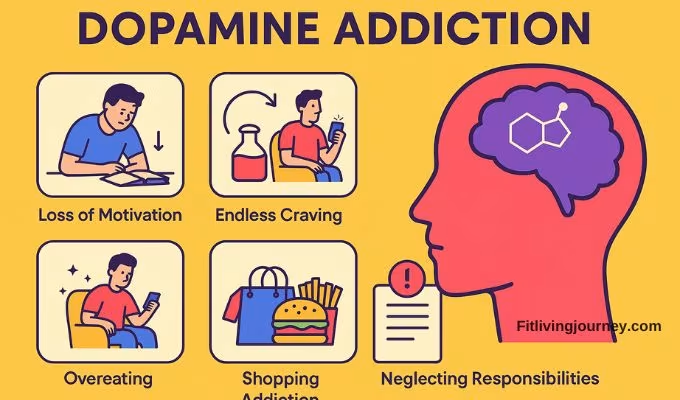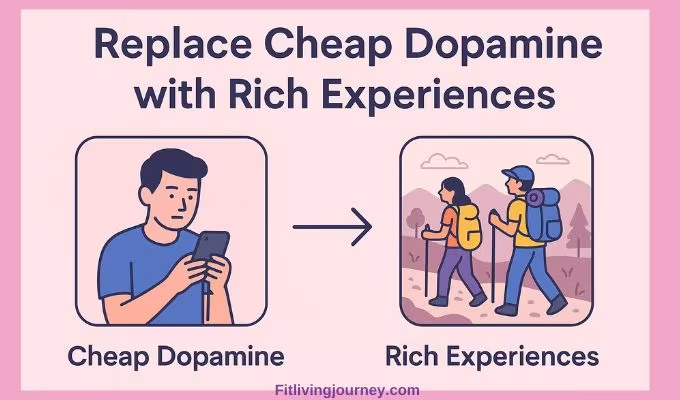Dopamine Addiction
Tell me something—does this sound familiar? You wake up, and even before your feet touch the ground, your hand reaches for your phone.
You think you’ll just check notifications for a moment, but hours pass while you’re scrolling.
This behavior is driven by dopamine in your brain.
What is Dopamine and Why It Matters
Dopamine is a hormone that your brain releases when you do something rewarding.
It’s the happy chemical that gives you a feel-good feeling.
Naturally, your brain produces dopamine when you engage in difficult tasks—like studying, learning a hard skill, or playing a challenging sport.
This is your brain’s way of rewarding effort.
But today, industries like technology, food, and entertainment have found ways to trigger dopamine artificially.
Whether you’re eating junk food, scrolling social media, or playing games, your brain gets pleasure without real effort.
This trains your brain to crave more of these easy dopamine hits, leading to a harmful cycle.
The Onset of Addiction
Over time, this leads to dependence. This is what we call dopamine addiction—and you are not alone. Lakhs of people suffer from it today.
Harmful Effects of Dopamine Addiction
- Loss of Motivation
When the brain gets pleasure without effort, it stops valuing hard work. You lose motivation to study, grow, or work towards your long-term goals.
- Endless Craving
You start chasing one pleasure after another, but nothing satisfies for long. It traps you in a cycle where happiness always feels just out of reach.
- Need for Constant Stimulation
Simple activities like reading or quiet conversations feel boring. You feel restless when there’s no stimulation or quick dopamine.
[[ Ayurvedic Remedies for Dandruff ]]
- Overeating
Foods high in sugar, fat, or salt trigger dopamine release. This leads to repeated eating just to feel pleasure again, causing unhealthy habits.
- Shopping Addiction
Each purchase triggers a short-lived dopamine high. Over time, you buy more and spend more, affecting finances and causing emotional stress.
- Neglecting Responsibilities
You miss deadlines, forget important tasks, and fall behind—affecting both personal and professional life.
Retraining the Brain: It Is Possible
The good news? Your brain can be retrained. You can start getting dopamine from real, meaningful efforts like learning, building strong relationships, and working towards personal growth.
Step 1: Protect the First Hour of the Day
The first hour after waking is crucial. Your brain is more sensitive at this time.
If you check your phone or social media immediately, you’re flooding your brain with quick dopamine. This sets the tone for the whole day.
So for the first hour, avoid screens, notifications, and excitement. Instead, set a calm morning routine:
- Practice breath work
- Eat soaked almonds or fruit
- Stretch, do asanas, or go for a slow walk
- Sit in stillness or meditate
At first, it might feel uncomfortable—this is withdrawal from constant stimulation.
But stay with it Gradually, your mind will feel calmer and more focused.
Step 2: Replace Cheap Dopamine with Rich Experiences
Controlling dopamine isn’t just about removing triggers. It’s also about replacing them with meaningful actions.
Instead of:
- Scrolling endlessly, read uplifting or educational books
- Watching random videos, journal or write down your goals
- Junk food, enjoy slow, nourishing meals
- Impulsive shopping, practice gratitude and observe emotions
Spend time in nature or try gardening. At first, your brain may resist.
But the more you choose meaningful habits, the more your brain will adjust—and learn to find joy in real, lasting things.
Step 3: Begin a 30-Day Dopamine Reset
Practice these habits for a month. This builds willpower for the next step: a 30-day dopamine fast.
Avoid apps, gaming, or unhealthy eating.
Your brain will start to rebalance, getting smaller dopamine doses from real effort—like workouts, studying, or learning new things.
The goal is to train your brain to enjoy effort-based rewards.
Let entertainment or snacks be a reward after hard work—not a distraction from it. That’s when you begin to enjoy life from within.
FAQ On Dopamine Addiction
Q 1. What exactly is dopamine and why does it matter?
Ans. Dopamine is a hormone released by your brain during rewarding activities. It creates feelings of pleasure and reinforces habits.
Q 2. How does dopamine addiction develop?
Ans. It develops when the brain gets used to receiving pleasure from easy sources like social media or junk food, rather than real effort.
Q 3. What are the signs of dopamine addiction?
Ans. Common signs include low motivation, constant cravings, boredom with simple tasks, overeating, shopping urges, and missing responsibilities.
Q 4. Can dopamine levels be balanced naturally?
Ans. Yes, by changing habits—such as avoiding quick dopamine triggers and engaging in effort-based activities—dopamine pathways can be rebalanced.
Q 5. What is a dopamine fast and how does it help?
Ans. A dopamine fast is a 30-day break from instant gratification activities. It helps the brain reset and regain joy from meaningful experiences.
[ [ Cold Water Bath for Weight Loss ] ]


